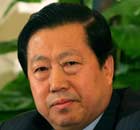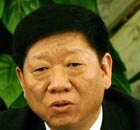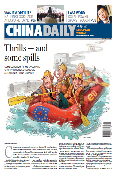Vital sign for securities market
Updated: 2009-09-09 07:53
By Yi Xianrong (China Daily)
The State Administration of Foreign Exchange (SAFE) issued the draft Foreign Exchange Administration Regulations on Domestic Securities Investment of Qualified Foreign Institutional Investors (QFII) on Sept 4 to solicit opinions, intending to increase the maximum quota for a single QFII from the previous $800 million to $1 billion.
SAFE also aims to reduce the shares lock-up period on the investment principal of medium- and long-term QFII on buying pension funds, insurance funds and open-ended Chinese funds - from 12 months to three.
| ||||
According to a SAFE official, the main objective of the draft is to improve and standardize the QFII foreign exchange management. This is not only a designated process in opening China's capital account, but also an endeavor to coordinate with the relevant departments to boost the development of the domestic capital market. This is an appropriate time to formulate the new rules. The key to buoying up confidence in China's economy and driving the world economy out of recession is to ensure a sustained and stable rise of the domestic equities market in the current special environment, as the Chinese stock market is a "policy market". The Chinese government has the responsibility and competence to do so.
The QFII scheme was introduced in China in 2002 on a trial basis with 86 overseas investors being granted QFII status as of the end of July 2009. A total QFII quota amounting to $12.8 billion has been approved by SAFE until the end of 2008 while at the same time, China has proposed to raise the total QFII investment quota to $30 billion. During the first US-China Strategic and Economic Dialogue held in August, Chinese top officials reiterated that they would hasten the examination and approval of QFII investment quota. It is estimated that the new rules will bring in an incremental capital of $17.2 billion. Some economic analysts, however, pointed out that there is still a large gap between the approved $12.8 billion and the proposed $30 billion.
The draft rules will further lay a solid foundation for the opening-up system of China's securities market and facilitate the overseas investors' orderly entry into it, thus promoting its sustained and stable development. We noticed that during the past few years after the introduction of QFII, the overseas investors' enthusiasm was not as high as we expected. There are two reasons for it. On the one hand, foreign investors would not like to enter a high-stake market when China's stock market risk began surging since the second half of 2007. On the other hand, the US subprime crisis was looming since 2007, especially after Sept 2008 when many overseas investment institutions were plunged into difficulties in their domestic markets and could not pay attention to foreign markets. But now with positive changes in China's stock market, foreign investors can invest in China at any moment as long as they are willing to do so. The problem is not whether overseas investors have the desire to invest, but whether China's stock market has good investment opportunities to attract them.
Therefore, the Chinese government should undertake the responsibility of safeguarding the sustained and stable development of the domestic securities market in a way as to offer more and better chances for investors both at home and abroad. The new rules show the authority's resolve and competence to maintain a sound development momentum of the stock market.
In addition, we should be fully aware that the recent ups and downs of the domestic stock market were not only incompatible with China's robust economic recovery, but also left negative effects on the international financial markets, leading many markets around the world to follow suit. It is not an exaggeration to say that if China falters, the world recovery, too, will be affected. The large drop in share prices or unstable A-shares market will definitely deal a blow to public confidence in domestic economic recovery and accordingly slacken the recovery step of the world economy.
China's stock market has become more influential and correlated with other markets all over the world than ever before. So the central government should adopt effective measures to guarantee the sound development of domestic markets so as to boost public confidence in China's economic recovery and further propel the world economy out of recession. In this regard, the draft rules not only provide convenience for QFII in entering the Chinese market, but also reflect the central government's endeavor and practice in bracing China and benefiting the world.
The author is a researcher with Institute of Finance and Banking of the Chinese Academy of Social Sciences.
(China Daily 09/09/2009 page8)
Paper's Digest

Chinese jet takes on Big 2
First large commercial plane set to ride on demand for aircraft as economy grows.
Super-CPU only for domestic eyes
Specials

Gaining ground
Doing business in china for westerners has come a long way, Peter batey says.

Safeguarding environment a priority
China continues to face mounting pressure to curb environmental degradation, despite progress in reducing pollution over the last five years, the environmental protection minister warned.

Employment to remain a continuing challenge
China's top labor official said the country will face a tough employment situation in the next five years.


